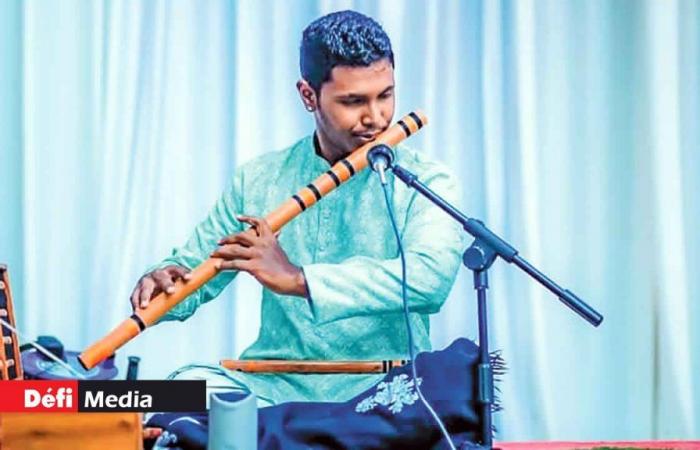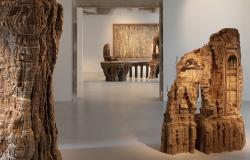At a very young age, Krishen Manaroo found in the melodies of the flute an echo to his soul, transforming a trial into a devouring passion. Discover how the captivating notes of the bamboo flute have sculpted his journey and his aspirations.
The music that flows from Krishen Manaroo’s Bansuri (bamboo flute) resonates. Tell stories. Evokes emotions. It transports the listener on a timeless journey. At 22 years old, this young Mauritian prodigy was able to transform a childhood ordeal into a devouring passion for the flute, navigating between traditional melodies and modern sounds with an ease that he himself describes as “inexplicable”.
Son of a stay-at-home mother and a “contractor” father, Krishen Manaroo lives in Terre-Rouge. He has an older brother and a younger sister. Two years ago, he completed his secondary studies at Soondur Munrakhun College in Montagne-Longue. While waiting to pursue further studies in music, Krishen Manaroo has currently embarked on a career as a freelance musician, playing a variety of wind instruments, while exploring many musical genres. In Le Dimanche/L’Hebdo, he confides that he has found in this universe not only a passion, but also a true life path.
How did this musical adventure begin? Krishen Manaroo says that during his childhood, he loved to contemplate the statuette of God Krishna and the way he stood to play the Bansuri. “I imitated him.” At the time, he did not know that bamboo flutes existed in Mauritius. “I heated a metal and drilled holes in a plastic pipe to make a flute,” the young man relates. Was he able to make musical notes come out? With a laugh, he says that it was more noise than music. At that time, he did not really aspire to play the flute.
At the age of seven, he suffered an accident. “During my stay in the hospital, I heard a ringtone on my mother’s phone, it was a flute melody. I found solace in musical notes and that’s when I developed an interest in this instrument,” he shares.
From then on, he insisted with his mother to have a flute. His older brother found him a wooden recorder, but it was not what he was looking for. And if at the beginning, he made a lot of noise, he says, with time and practice, these noises became melodies.
A few years later, Krishen Manaroo is about 13 years old. During school holidays, he works as a street vendor selling clothes in Port Louis. “One day, I saw a man selling wooden flutes at the central market. He was selling this flute for Rs 50. My brother and I only had Rs 50 in our pockets. It was our money for the bus ride and we had to pay Rs 12 each to go home. The man kindly sold us this wooden flute that I absolutely wanted for Rs 25,” he recalls with nostalgia.
Although he never saw the man again, Krishen Manaroo remembers that he was very tall, fair-skinned and wore a cap. “What I am today is partly thanks to him, because he sold me the flute I wanted and I want to thank him. He changed my life.” For him, his journey, marked by his accident, awakened his love for the flute and what followed is a story of discovery, perseverance and spiritual growth.
Today, Krishen Manaroo, who says he plays sports, especially soccer, and collects Marvel figurines and toy cars in his spare time, plays a variety of wind instruments, including the transverse flute, the Shehnai, the saxophone, the recorder, the harmonica, the Irish Tin Whistle, the Xaphoon and the Hulusi. He even recently started playing a Yamaha company instrument called Venova, a pocket saxophone. Where does he get this passion for music? “I don’t come from a family of musicians. My older brother sang and my passion for music started at home,” he says.
Carnatic and Hindustani music, two forms of Indian classical music, are the mainstays of Krishen Manaroo’s musical repertoire, and he also composes his own melodies. Originating from South India, Carnatic music is characterised by its complex melodic structures and rich compositions, while Hindustani music, which comes from North India, is characterised by its improvisation and elaborate ragas (musical notes), he explains. He listens to them a lot to get inspired and be able to play like the great virtuosos.
As a flautist, Krishen Manaroo fuses these two styles while incorporating elements of Western, Irish, Chinese and even Arabic classical music. This eclectic approach allows him to offer varied performances that captivate a wide audience, resonating with the diverse musical tastes of his listeners. His ability to navigate between different musical traditions is a testament not only to his virtuosity, but also to his deep respect for the various forms of musical expression.
To showcase his talents as a self-taught flautist, Krishen Manaroo participated in many major memorable events. However, his first full performance of Hindustani classical music, organized by the Infinity Group, which promotes Hindustani classical music in Mauritius, will remain forever memorable.
Some of his favourite composers are Hariprasad Chaurasia, Ravi Shankar, Hans Zimmer, Yanni, Simon and Garfunkel, Rupert Gregson-Williams and AR Rahman. “They are all famous and very talented in their field. Their music gives me a sense of peace, gives me ideas and transports me to another world,” he confesses. He often listens to the sounds of nature and discovers many melodies in them.
How do you recognize a good flutist? It is when he is able to make the flute sing and bring it as close as possible to the human voice, answers Krishen Manaroo. He plays to send a message of love and he tries to touch everyone’s heart through his music.
Is it difficult to make a career as a flautist in Mauritius? “There are not many platforms in Mauritius to promote Hindustani and Carnatic classical music. Moreover, it took me seven years to finally buy my first set of professional flutes because I had no financial backing and had to work hard to save money,” he says.
Thus, according to Krishen Manaroo, it is essential to create more platforms for classical music in the country, and to offer more opportunities in order to prevent the disappearance of one of the oldest forms of music. In the future, the young player from Bansuri plans to turn his passion into his profession. He also hopes to instill in those interested in Bansuri a respect for the wooden flute. He wants children today to not only listen to music but also be able to distinguish between good and bad music.
Moreover, for him, music should be taught from a very young age. “Learning music as a subject should be introduced from kindergarten to secondary school.”
And what is his biggest dream? Krishen Manaroo reveals that it’s playing the flute alongside some of his great inspirations like Pandit Hariprasad Chaurasia, Pandit Rakesh Chaurasia, Pandit Rajendra Prasanna and Pandit Ashwin Shrinivasan, but also traveling the world with his music.
His choice to play the bamboo flute
How did playing the flute change his life? “It connected me to the depths of music, which made me more spiritual because music is God and God is music. This art helped me travel outside of Mauritius, and contributed to making me a more calm and understanding person,” he replies, while confiding in us with a laugh that before, he was a real “bitor”.
For Krishen Manaroo, the bamboo flute is an instrument that is part of nature itself. “It is made of a single piece of bamboo and has only seven holes. I like the sound of the flute because it reminds me of nature. It is like a cuckoo bird singing,” he says. But while it is one of the oldest instruments in the world, it is one of the newest additions to Hindustani classical music.






